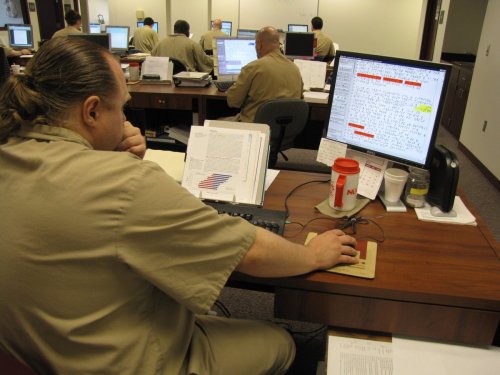Increasing the Availability of Braille Books

Imagine sitting in your classroom where all the students are working in small groups solving math problems from their textbooks, except you. You are visually impaired and need materials in braille. Since braille textbooks take months to produce, and this is the year for new math books, your textbook in braille has not arrived yet. Unfortunately, this happens frequently to students who read braille.
The good news is that the Florida Instructional Materials Center for the Visually Impaired (FIMC-VI) has launched a new program to increase the availability and timely delivery of high-quality braille textbooks in both hard- copy and digital formats. Staff members from FIMC-VI are teaching incarcerated individuals to become certified braille transcribers. Through a joint effort between the Florida Department of Corrections, PRIDE Enterprises (Prison Rehabilitative Industries and Diversified Enterprises, Inc.), the American Printing House for the Blind (APH), Visual Aid Volunteers of Florida, FIMC-VI and the Sumter Correctional Institution in Bushnell, 20 inmates will be guided through the Literary Braille Transcribing course. Completing this course will result in them earning national braille certification from the Library of Congress, National Library Service for the Blind and Print Disabled. The inmates in Bushnell will begin with literary certification and then learn braille formatting; proofreading; how to convert pictures, maps, graphs, and charts to tactile representations; and the specialized braille symbols needed for mathematics and science books. This course of study can take 18 to 24 months. Once certified, if they want to advance their skills, the men can continue learning additional braille codes for Spanish, other foreign languages, and even music braille.
With assistance from the National Prison Braille Program at the American Printing House for the Blind, equipment will be purchased to allow the program at Sumter Correctional Institution to convert print books into braille, create tactile pictures, and emboss pages with specialty braille embossers that act as tactile printers. These books created by the inmates will be bound, labeled, and shipped to FIMC-VI for delivery to students in Hillsborough County and across Florida.
Not only will this program benefit Florida students who read braille, it also helps prepare inmates for successful careers as Library of Congress Certified Braille Transcribers upon release. With 36 prison braille programs across the United States, there are approximately 800 men and women working in prison braille programs. Learning braille and producing braille books gives the inmates a way to use their time productively and give back to society. Our students and teachers benefit by having braille books more readily available. When braille books are delivered sooner, the student who reads braille can be engaged in the learning process along with their sighted peers!
